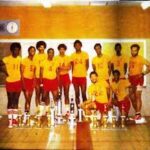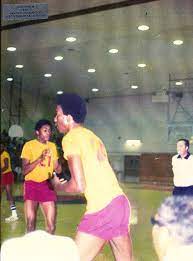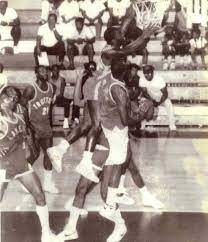
Whenever the conversation arises about which city is the best basketball city, one question always gets to the heart of the matter. It’s not “How many dudes from your city made it to the league?”. Sure, that’s a feather people like to put in their cap. But the question that truly defines how much weight your city holds in these hoops conversations is “What your summers look like?”. You cannot have a seat at the table without a strong summer league/ProAm culture. You need a Rucker Park or a Dyckman. Your city has to boast the likes of a Sonny Hill League to be considered an upper-echelon hoops city. You know I’m about to tell you where DC fits into this hierarchy if you’ve been paying attention. A hot, muggy, sweaty gym at an NW high school was the backdrop for some of the greatest summer basketball that’s been played anywhere in the history of the US. NBA players rumbled with guys from around the way and unless you knew who they were, you couldn’t tell who was who at times. With little more fanfare than word of mouth, the stories spread like wildfire and you’d have people lined up at least an hour before the 10:00 am tipoff for the first games of the day. This was a league like no other and one of which the likes can’t be recreated. I’m about to take you on a journey about the history of the Urban Coalition. But if you’re from where I’m from it’s simply called “The Urbo”.
Summertime basketball in DC has always been a big deal. But the Urbo was the first league that was established here. In the 50s and 60s, local legends, pros, and everyone in between would meet up on local courts and rumble from sun up to sundown. Places like Turkey Thicket and Kelly Miller provided the scenery for classic blacktop battles and the latter was the setting for a legendary summer of hoops in 1957 where none other than Wilt Chamberlain came to DC played pickup against Elgin Baylor every day. I couldn’t imagine being able to experience that. If Doc Brown pulled up right now in the DeLorean and said “Where do you want to go?”, Kelly Miller courts in ’57 would be on the shortlist. But I digress. Back to the lecture at hand. The playground matchups were must-see TV but there wasn’t any centralized place to catch the best basketball the city had to offer. Enter the Urbo. Jim Wiggins started the league in 1971. He said he wanted to give people a chance to see top-flight hoops but also provide a haven for people during those tumultuous summer months in the city. Birthed out of the citywide turmoil of the ’68 riots, Wiggins saw an opportunity to settle the unrest and in a few years, he was able to create something that connected to the heart of the city through hoops and at the same time, give young people a chance to be exposed to running a business. Wiggins usually had teens running a lot of the administrative duties associated with running the league. In true DC Hoops fashion, that first summer had fireworks. Dr. J and George Gervin blessed the Coalition with appearances during its inaugural season. And every following summer for the duration of its run, stars flocked to the Urbo for competitive runs. The league had a few homes before settling into the location it has become most familiar with at Dunbar High School. Theodore Roosevelt, Gonzaga, and the aforementioned Spingarn housed it through the 70s and was revived in the mid-90s at Bishop McNamara, but most of the memories that ring out took place at the home of the Crimson Tide.

You have to understand the lineage of the players that have come through this league. I’ve already mentioned Dr. J and George Gervin. Moses Malone was also a regular at the Urbo. Adrian Dantley made it a point to lace ’em up there every summer. Sherman Douglas and Muggsy Bogues treated the DC crowds to some classic battles. Sam Cassell used to go at it with one of DC’s finest, Curt “Trouble” Smith (stay tuned for more on him in the coming weeks). With the talent that made its way onto the floor every week, playing in the Urbo wasn’t for the faint of heart. That first experience could be intimidating. Jim Wiggins (Urbo Founder) said in a Washington Post interview from 1990 that David Robinson might have had a small case of the “Urbo Flu” his first time out but it must have been a 24 hr bug because Robinson came back the next day and went to work. Some guys were just built for it though. John Battle, who played 10 years in the NBA with the Hawks and the Cavs, never missed an opportunity to go to the Urbo and put on a show. This was the ultimate stage for securing bragging rights and the prime opportunity for showmanship. Flashes of Melvin Middleton coming down the court, waving his hands around the ball after he bounced it to freeze the defense on some remixed Pistol Pete shit. After which the defenders part like the Red Sea and he slowly trots his way to the basket for an easy layup. If you just so happen to stumble in the gym on a weekend afternoon, you might see Dennis Scott knocking down threes from half-court.
Pros lived at the Urbo. And while they might have been welcomed by the adulation of fans off the court, they were greeted with anything but on it. There wasn’t animosity or any malice involved, but the atmosphere was feverishly competitive and that’s putting it mildly. A little gamesmanship was always present as well. Like when Dennis Scott brought Nick Anderson and Penny Hardaway to Dunbar. Shaq accompanied them as well but the big fella didn’t play. Penny already knew a couple of local guys, of course, Dennis Scott was his teammate and Lonnie Harrell (please believe there’s more to come on him) had spent time with the Magic in training camp. So 3D (Dennis Scott) and Harrell decide to set Penny up. There was a guy on the opposing team named Greg Jones who is one of the most prolific ball handlers and scorers to ever come out of DC. He shared a backcourt with Moochie Norris in high school and went on to play for West Virginia and in several professional and semi-pro leagues. And when I say he could put the ball in the hole, that’s exactly what I mean. One year in JUCO, he scored more points than any college player in the nation. Not just in junior college but at every level of college. If you played in anything that started with an “N” and ended with an “A”, G-Wiz scored more points than you. So in typical hood scouting report fashion, players are sizing each other up before the game. Scott and Harrell put the bug in Penny’s ear that Jones couldn’t shoot (a lie from the pits of hell) and all he had to do was play off him to prevent the drive (a setup). So the game starts and Jones comes out firing. He hits 4 threes in a row and at that point, Penny peeped game, shot Dennis and Lonnie one of those “You dirty muthafuckas” smirks, and decided he was going to put an end to this. He presses up on Jones and proceeds to get dropped and Wiz knocks down the three. The gym erupts and a legendary DC hoops moment is born. Don’t get it twisted, after this happens, Penny proceeds to show the entire gym why he’s Penny but regardless, a battle ensued. Just to give you a hint of the level of deception 3D and Lonnie were up to, Greg Jones scored 70 pts two weeks before this infamous encounter.

The Urbo experience was magical. It was some of the most competitive basketball you could find short of the NBA. The Washington Bullets (Wizards) used to annually send a team to the league to get their guys in shape prior to training camp. Unfortunately, the league isn’t celebrated in the manner that it should be. It’s quite puzzling how something so legendary has remained essentially buried and hidden from the public. As you can see, I was barely able to scrape up some decent pictures for this article. The Urbo is far too important to have fallen into the “Out of sight, out of mind” abyss. It should be just as heralded as the Drew Leagues and the EBCs of the world. It’s like that big, blue diamond the old lady threw off the back of the boat at the end of Titanic. One of the most valuable treasures of the basketball world is seemingly lost to the masses. The legacy of the Urban Coalition must be resurrected. If it was as highly publicized as the other leagues I’ve previously mentioned, I guarantee the discussions around “What’s the best summer league ever?” would look a little different.

Pingback: DC Hoops Untold Stories: Anthony “Jo Jo” Hunter | Lyons Den Sports